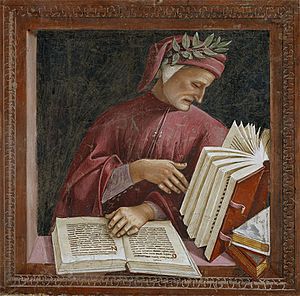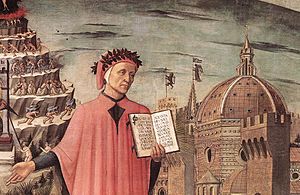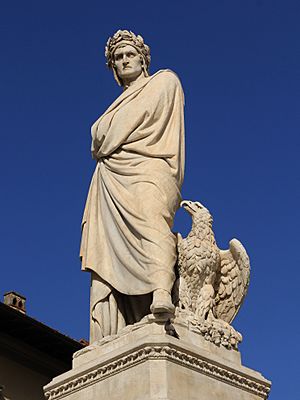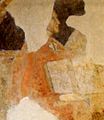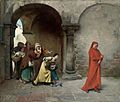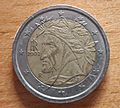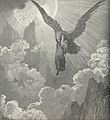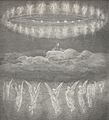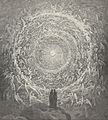Dante Alighieri facts for kids
Quick facts for kids
Dante Alighieri
|
|
|---|---|
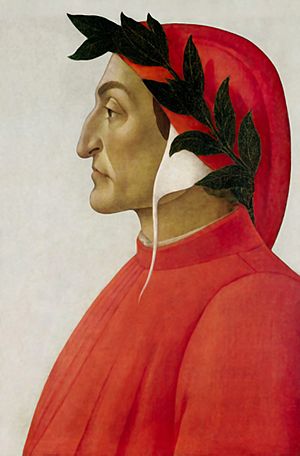
A portrait of Dante painted after he died
by Sandro Botticelli, 1495 |
|
| Born | c. 1265 Florence, Republic of Florence |
| Died | September 13 or 14, 1321 (aged around 56) Ravenna, Papal States |
| Occupation | Statesman, poet, language theorist, political theorist |
| Language | Italian Tuscan |
| Nationality | Florentine |
| Period | Late Middle Ages |
| Literary movement | Dolce Stil Novo |
| Notable works | Divine Comedy |
| Spouse | Gemma Donati |
| Children | 4 |
Dante Alighieri, often called just Dante, was a famous Italian poet from Florence. He was born around May or June 1265 and died on September 14, 1321.
His most important work is Commedia, also known as Divine Comedy. Many people think it's the greatest book ever written in the Italian language. In Italy, he is called "the Supreme Poet" (il Sommo Poeta). Dante and his Divine Comedy have inspired artists for nearly 700 years.
Dante is also known as "the Father of the Italian language." He helped shape the Italian language we know today. The most famous part of The Divine Comedy is its first section, called Inferno. This part describes Dante's amazing journey through hell.
Dante's Early Life
Dante Alighieri was born in 1265 in Florence. His full name was "Durante Alighieri." His family was important in Florence and supported the Papacy, which means they supported the Pope's power.
Dante's mother, Bella degli Abati, died when he was seven. His father, Alighiero, later married Lapa di Chiarissimo Cialuffi. Dante had a half-brother, Francesco, and a half-sister, "Tana."
When Dante was 12, in 1277, he married Gemma di Manetto Donati. However, Dante had already fallen in love with another girl named Beatrice Portinari. She is a very important character in his Divine Comedy.
Dante and Gemma had several children, including Jacopo, Pietro, Giovanni, Gabrielle, and Antonia.
Education and Poetry
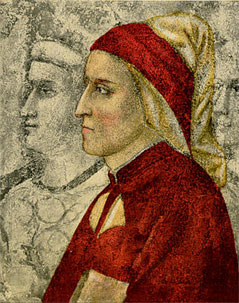
We don't know much about Dante's early schooling. It's thought he studied at home. He was very interested in Tuscan poetry. He also learned about Occitan poetry from the troubadours and Latin poetry from ancient times. He especially admired the Roman poet Virgil.
When he was 18, Dante met other poets like Guido Cavalcanti and Brunetto Latini. Together, they became leaders of a new style of poetry called Dolce Stil Novo, which means "The Sweet New Style." Brunetto Latini is even mentioned in Dante's Divine Comedy because of how much he taught Dante.
In his work La Vita Nuova, Dante wrote about meeting Beatrice Portinari when he was nine. He fell in love with her right away, even though they barely spoke. He saw her often as he grew older, and she became his inspiration for poetry. This kind of love, where someone admires another from afar, is called "courtly love." Beatrice was so important to him that she appears almost like a divine guide in many of his poems.
After Beatrice died in 1290, Dante looked for comfort in Latin literature. He also studied philosophy at religious schools, like the Dominican school in Santa Maria Novella.
Exile and Later Life
Dante was involved in the politics of Florence. He was a member of the Guelph party, which supported the Pope. He even fought in the battle of Campaldino in 1289.
However, political fights in Florence became very intense. A group called the Black Guelphs took control of the city. In 1301, Dante was in Rome on a mission. While he was away, the Black Guelphs destroyed parts of Florence and harmed their enemies. A new government was put in place.
Dante was accused of wrongdoing and was ordered to pay a large fine. He refused to pay because he believed he was innocent. As a result, he was sentenced to exile for life. This meant he could never return to Florence. If he did, he could be burned at the stake.
During his exile, Dante began writing his masterpiece, the Divine Comedy. This long poem has 100 sections, called cantos. It is divided into three main parts: Inferno (Hell), Purgatorio (Purgatory), and Paradiso (Paradise).
Dante traveled to many places during his exile, including Verona, Sarzana, and possibly Paris. He hoped that a new Holy Roman Emperor, Henry VII, would help him return to Florence. He even wrote letters asking Henry to defeat the Black Guelphs.
Dante died in Ravenna on September 14, 1321. His body was buried there. Even though a tomb was built for him in Florence in 1829, his body has always remained in Ravenna. The tomb in Florence is empty. On the front of his empty tomb in Florence, it says: Onorate l'altissimo poeta, which means "Honour the most exalted poet."
Images for kids
-
A mural of Dante in the Uffizi Gallery, Florence, painted around 1450
-
A Cenotaph (empty tomb) for Dante in the Basilica of Santa Croce, Florence
-
An illustration for Purgatorio (the second part of The Divine Comedy) by Gustave Doré
See also
 In Spanish: Dante Alighieri para niños
In Spanish: Dante Alighieri para niños
 | Leon Lynch |
 | Milton P. Webster |
 | Ferdinand Smith |


